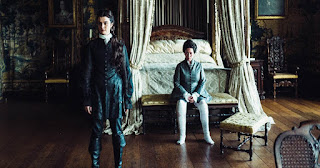Roma (2018)
[Reader disclaimer: spoilers will be discussed].
This is it, ladies and gents and non-binaries alike: this is the last hurdle. We finally come to Roma (2018), the 8th and final Best Picture nominee. I had placed this one last due to convenience but also because I am such a fan of director, Alfonso Cuarόn.
It was to my disappointment, then, when I found myself not enjoying Roma very much. In fact, I tweeted on Thursday night (@Hristowen) that "[...] I feel like I was meant to like that more than I actually did, which is disappointing in itself".
Before I delve into why I felt that way, I would like to say that I think Roma is an incredibly important film. There's a reason why there's so much love and hype surrounding it: it is a vital watch, in my opinion, due to its subject matter. However, just because something is skilfully made, it doesn't mean it can't be monotonous, and I found myself coming to that conclusion after only 10 minutes into the runtime.
Anyway, I digress.
Roma is a realism piece, set in 1970-71, which follows the lives of a family and their maids (played by Yalitza Aparicio and Nancy García). It explores the socio-political struggles of that era, interspersing shots and background dialogue of violent, civil uprisings, themes of adultery and commentary of working class in such a realistic way that the audience feels as if they are truly an observer to the real lives of others.
I found the characters to be authentic and endearing, as well as the interpersonal relationships that are established on and off screen: the maid character, Cleo (Aparicio) in particular becomes the forefront of the family's narrative, showing her dedication to her work, her accidental pregnancy and subsequent loss of child, as well as her bond with the family (especially the children) strengthened as time goes by.
The cinematography is wonderful, as expected of Cuarόn. The panoramic and tracking shots, accompanied with purely diegetic sound, grounds the film in its realism and makes for an immersive viewing experience. Certain scenes are so skillfully constructed (like the scene of Cleo giving birth to her stillborn daughter) that, although they translate as harrowing and upsetting, they are also raw, arguably visceral in their understanding of real life.
Roma is also successful in its ability to be subtle: from poignant scenes such as Antonio (played by Fernando Grediaga) parking his car with precision, demonstrating what kind of a man his character is before we even hear any dialogue from him, to more subtle scenes such as the civil war propaganda that can be seen behind characters, out of focus but not out of frame.
It's undeniable that this film is skilfully made but my biggest argument is that it's a think-piece. And there's nothing wrong with that, but it stands out like a sore thumb in comparison to the other Best Picture nominees, arguably focusing too much on interpretation than anything else.
As time went by, I found myself losing interest in what was happening. The opening three minutes of film alone have absolutely no sound, focusing primarily on the floor as water is being washed over it: yes, I know this parallels the end of the film, and I know what symbolic significance it holds in regards to the rest of the narrative, but it's not engaging. I found it monotonous and it dragged on for a long time.
Despite the ending being uplifting, with the characters emerging from their individual feats of pain and pursuing a happier way of life, I also felt as if it took too long for us to get there; it reminds me somewhat of Bicycle Thieves (1948): wonderfully edited and shot but not particularly engaging until the second half of the film. The third act, in my opinion, was the best part of the film because more things happen. A film doesn't have to be as action-packed as Mission Impossible (1996) to get its point across but it does have to give the viewer a reason to keep watching it: if I hadn't have sat down to review this film, it's very likely that I wouldn't have had the attention span to finish it, which is saying a lot.
I think this may come down to taste. Roma is a brilliant film in many ways but perhaps it's just not my kind of film: I know that it has garnered praise from many critics and websites alike, so I objectively know that it's not as boring as I made it out to be.
What's it nominated for?
Currently, Roma is nominated for:
- Best Picture - Alfonso Cuarόn and Gabriela Rodriguez
- Best Actress - Yalitza Aparicio
- Best Supporting Actress - Marina de Tavira
- Best Director - Alfonso Cuarόn
- Best Foreign Language Film - Alfonso Cuarόn
- Best Original Screenplay - Alfonso Cuarόn
- Best Cinematography - Alfonso Cuarόn
- Best Sound Mixing - Skip Lievsay, José García and Craig Henighan
- Best Production Design - Barbara Enriquez and Eugenio Caballero
- Best Sound Editing - Sergio Diaz and Skip Lievsay
Should it win?
Despite the fact that I personally didn't enjoy it, I know that it's a wonderfully executed film and I have no doubt that it will garner a lot of votes for Best Picture. Whether it'll win or not, I don't know.
I am almost 99% convinced that it will get Best Cinematography and Best Sound Editing, due to the fact that I'd argue it goes unrivalled: The Favourite (2018) and A Quiet Place (2018) are probably its only competition in those areas and I'll be hugely disappointed if it doesn't win either award.
I cannot say for certain where it stands in association with Best Foreign Language Film because I currently haven't seen any of the other nominees, but I think it stands a good chance of winning that as well.
Overall rating: 7/10
- K












